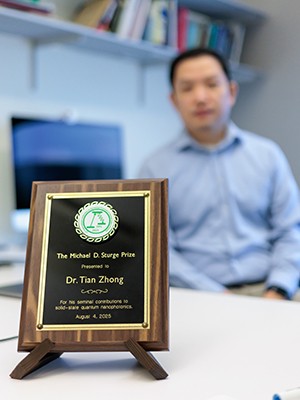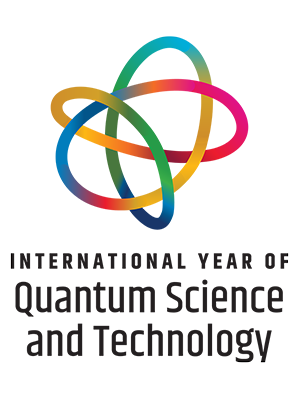University of Chicago Pritzker School of Molecular Engineering (UChicago PME) Asst. Prof Tian Zhong has been awarded the 2025 Sturge Prize from the 22nd International Conference on Dynamical Processes in Excited States of Solids.
The award, presented Aug. 4 at the conference, is given to one early-career researcher in the field of condensed matter spectroscopy. Given once every three years, it has honored researchers from around the world. Zhong was specifically honored for his seminal contributions to solid-state quantum nanophotonics.
“I am humbled and excited at the same time to be recognized for my team’s work,” Zhong said. “Rare-earth quantum nanophotonics didn’t even exist ten years ago. I feel tremendously excited to be a part of the exciting development of this emerging field. It drives us to continue to innovate and be a leader in building quantum devices.”
Zhong and his team develop cutting-edge materials and technologies that enable quantum networking, laying the groundwork for a future quantum internet. His team has pioneered a new bottom-up method of creating rare-earth ion doped thin crystals, which have a unique atomic structure that makes them ideal for quantum memory and interconnect applications. He and his team create the nanometer-micrometer thick crystals such as yttrium oxide through a technique called molecular beam epitaxy, which essentially sprays atoms layer by layer until the crystals are created. Importantly, these quantum-grade materials are produced at the wafer-scale for potential mass production.

The rare-earth ion-doped crystals’ unique structure and symmetry properties help them preserve rare-earth dopants’ quantum states longer—a major goal for both quantum computing and networking. Zhong and his group have used this novel material to create quantum memory and erbium spin qubit devices that will help preserve quantum information along a fiber-optic network. His group recently demonstrated, for the first time, a long-coherence spin-photon interface at the telecom wavelength and is now working to entangle multiple erbium qubits over a long optical fiber network. He and his team test their devices on Chicago’s quantum network.
“If you want to send quantum information over a quantum network to somewhere far like New York, you can use these memory devices along the way. The information can hop from memory to memory until a full quantum connection is established,” he says. “Rare-earth ion-doped materials are becoming recognized as a leading platform for quantum memory.”
Zhong has previously received a National Science Foundation CAREER award. The Sturge Award is named in honor of Dartmouth College professor Michael Sturge, who made significant contributions to the understanding of the optical properties of the condensed phases.
2025 International Year of Quantum Science and Technology

The United Nations declared 2025 the International Year of Quantum to mark a century of progress in quantum science and engineering. The University of Chicago and its partners join the celebration of the groundbreaking fields that continue to positively impact lives around the world.